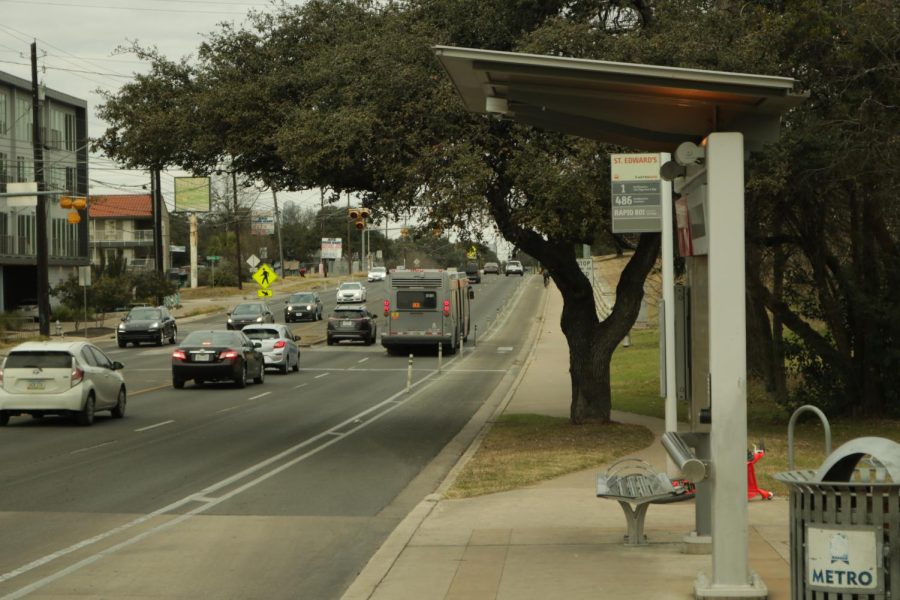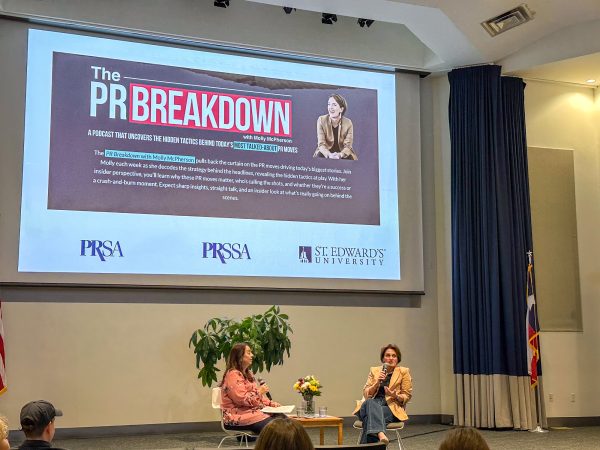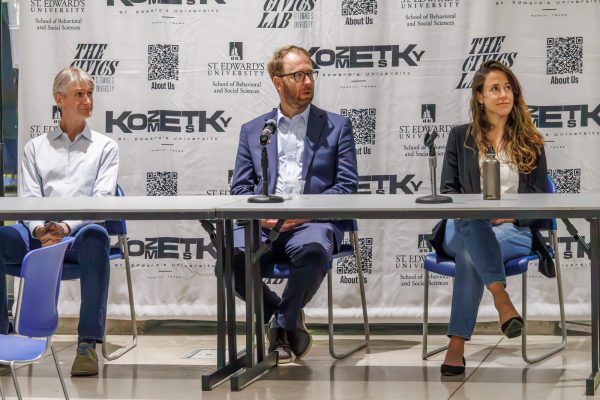Free bus fare introduced, offers students transportation to and from campus
Two Capital Metro bus stops are located at the edge of campus along South Congress. This includes the aptly named St. Edward’s stop.
For years, University of Texas and Austin Community College students have enjoyed an amenity that St. Edward’s students haven’t had: free rides with Capital Metro. Thanks to an initiative spearheaded by students and negotiated by faculty, St. Edward’s students living on campus can enjoy the amenity, too.
Esther Heymans is one of those students. She’s a sophomore living on campus who, before enrolling at St. Edward’s, lived in the Dallas-Fort Worth area and drove everywhere she needed to go. She decided to not bring a car when she came to Austin, and after a short stint trying to ride her bike around the city, she’s been riding CapMetro for her everyday travel needs. Her payments, which used to average around $28 per month at the university’s 30% discounted CapMetro pass price, have been cut to nothing.
“It’s easier to get around now, and less stressful. It’s nice being a passenger,” Heymans said.
“Free” CapMetro passes didn’t appear out of thin air, though. They’re “no-cost,” with the budget for on-campus CapMetro riders drawn from the decisions to hybridize on-campus police vehicles, according to St. Edward’s Sustainability Coordinator Jim Morris.
“The plan was to get hybrid police vehicles replaced at the same time budget questions came up about free bus passes,” Morris said.
This budget decision was encouraged by Morris and is different from the University of Texas’ CapMetro budget decision, which takes money from students’ tuition to give every student access to rides that are free at the point of sale.
“It’s been a long process, and nothing has been straightforward. I’ll put it like that,” Morris said.
Ethan Tobias, president of the university organization Students for Sustainability, worked with Morris and helped execute the free CapMetro plan as part of his role as a sustainability intern. Tobias has long amplified student voices, like Lauren Henry’s, who have pushed for accessible and sustainable student transportation.
“I believe in a collective effort when it comes to issues like sustainability,” Tobias said. “Texas needs its people to push continuously to make cleaner forms of transportation more accessible.”
Now, Tobias is pushing for off-campus commuters to gain access to free rides on CapMetro, too. But, according to Morris, this will be difficult to advocate amongst faculty, as many students who usually pay for on-campus parking passes wouldn’t be paying anymore if they were able to ride CapMetro for free.
Coincidentally, one of the reasons that Heymans said she didn’t bring a car to Austin was because she wanted to save money on parking. Another was that she doesn’t like driving too much. But riding CapMetro doesn’t always work out for Heymans. Sometimes, she knows that trips will be impossible to manage on a school day or to get where she needs to go on time.
“Sometimes, I can’t meet up with friends. One time, my ride back to campus got canceled entirely,” Heymans said. “But it doesn’t seem like there’s a huge push to increase the efficiency of rides near campus because there aren’t many people riding the bus here.”
So, Heymans will ask for a friend to drive her, which is more convenient and manageable than a bus ride. The convenience, she says, is paradoxical, the symptom of a state and its cities prioritizing drivers for decades.
“People who ride public transportation have long been underrepresented in the planning of infrastructure in cities based around driving,” Heymans said. “So, even if you don’t need to ride public transportation, care about the people who do.”
Clarification: The term “commuter” refers to someone who uses public transportation for everyday travel. An “off-campus commuter” refers to students who do not live on campus and commute to St. Edward’s everyday.









